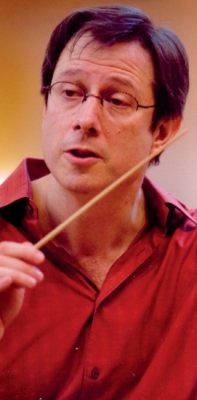Maestro in His Own Right
We met on the Tel Aviv seafront overlooking the yachts in the Marina. Maestro Stern was easy to recognize, neatly and casually dressed. His manners were clearly European, not New York, and his English delightfully colored by a French accent. He was completing his current season with the Israel Opera as their musical director. He greeted me warmly and said how he enjoyed meeting people at this place by the sea, "where there are no loud car horns".
B.P.: How does it feel to be Isaac Stern's son? Your father was my first musical hero, and I probably took up and stayed playing the violin because of him.
He was clearly ready for this.
"One must be ready in life to be one's self, to establish a reputation without depending on connections. I have just celebrated my 50th birthday, and feel I am now my own person, with my special interests and abilities. I feel stronger for it."
David Stern founded Opera Fuoco in 2003, an ensemble with which he explores a large, mainly lyrical repertoire, using instruments of the era. With Opera Fuoco Maestro Stern has recorded Johann Christian Bach's opera Zenaida, and will be recording a prequel to Mozart's Cosi fan Tutte as well as a record of French romantic cantatas.
How did you reach the place you are at today in the musical world - conducting your own orchestra in Paris - the Opera Fuoco ensemble, as well as being musical director of the Israel Opera and guest conductor with orchestras in the USA, China, Canada and Vienna?
"I finished studying at the Julliard School of Music in 1990, and then was apprenticed to the Baroque conductor, John Elliot Gardiner in Paris. I also worked with other famous conductors who were pursuing opera as a special interest. I saw these people as unique musicians who were taking an extra step to integrate music with telling a story. I love exploring opera through Handel's wonderful oratorios which are such an important part of the history of opera."
How do you find working with the Israel Opera?
"I love working here. I have been spending nearly half of every year here since taking on the role of musical director of the Israel Opera in 2008, and am constantly stimulated by the energy and enthusiasm of the Opera and its singers. The Israel Symphony Orchestra Rishon LeZion is doing great work under the conductor Dan Ettinger, and I never have a feeling with them that they are tired out after a few performances. They are growing from strength to strength. We are going to move from traditional opera and work on Esther, Handel's first oratorio. I am also starting to do master classes at the Jerusalem Academy of Music, and involve young singers in recruiting more young people to the field of opera. I definitely see a rise in the level of vocal talent in this country."
You have also shown an interest in performing Israeli music.
"Well, what does 'Israeli music' really mean? I am actually more interested in Hebrew music. Israeli music has been influenced by a multitude of cultures, and I want to show the meaning of opera which is integral with the language. Schubert belongs with German, and Verdi wrote differently in French than in Italian. The first truly Hebrew opera was Dan Hashomer (Dan the Guard), written by Marc Lavry in 1941-42. The opera depicted the life of the pioneers in Israel in those days. Getting back to Handel, he also relates to Jewish history in the oratorio Esther, and he alludes to Israel not returning to its land, in a very contemporary way."
Stern loves developing important and daring works in his repertoire, including The Child Dreams by Israeli composer Gil Shohat.
How do you deal with family and career?
"I have lived in Paris for the past 15 years. My wife is a violinist and concertmaster, and I have a 17-year-old daughter who is an excellent singer and a 15-year-old son who plays the violin well. I play the piano and harpsichord. My brother, Michael, conducts an orchestra in Kansas City in the USA, and my sister, Shira, is a rabbi."
Have you been exposed to criticism for your intense involvement with Israel?
"I have never heard opposition to my role here, though there are probably people who feel that way."
While drinking our coffee and chatting, he received a number of phone calls and apologized for having to take care of some urgent problems. "I am also battling with budget cuts which will affect my future schedule here," he said.
Despite his obvious time constraints, David Stern seemed perfectly at ease chatting with me, and as stated in his biography (IMG Artists), he is clearly "a born communicator who rivets his musicians, students and audiences by sharing his strong musical convictions, his flexibility of approach and his belief that music is of essence and relevance in today's world". It was easy for me to picture him as a family man enjoying the company of his musical family, and as a teacher and leader for musicians and singers of all ages. It was also touching to feel his true love and enthusiasm for the Israel Opera, the young orchestra that accompanies it and for the musicians and the people of this country.
I allowed myself a few moments of envy for this young and innovative musician, who divides his life between France, Israel, the USA and the rest of the world, helping us to understand and enjoy different modes of music and the importance of the artist in our crazy society. I also felt I had met a real "mensch".








Comments